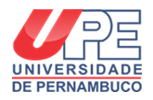
Discente: NÉFI MACIEL DO NASCIMENTO
Título: ANÁLISE, CLASSIFICAÇÃO E DETERMINAÇÃO DE CRITÉRIO DE ACEITAÇÃO DO LIMITE DE DESCARGAS PARCIAIS EM MOTORES DE INDUÇÃO DE MÉDIA TENSÃO APÓS TAF
Orientador: PROF. DR. SÉRGIO CAMPELLO OLIVEIRA
Examinador Externo: PROF. DR. LEONARDO RODRIGUES LIMONGI
Examinador Interno: PROF. DR. GUSTAVO DE OLIVEIRA CAVALCANTI
Data: 18 DE NOVEMBRO DE 2024
Horário: 09:00
Local: Online
Resumo do projeto:
A manutenção preditiva de máquinas elétricas rotativas, como motores e geradores, é essencial para evitar falhas e assegurar a continuidade operacional na indústria. Para motores de média tensão e alta potência, é essencial garantir a confiabilidade e o funcionamento eficiente dentro de plantas industriais, especialmente em unidades de produção de petróleo e gás natural. Devido ao seu alto custo, é imperativo realizar ensaios durante a etapa de fabricação, conhecidos como Testes de Aceitação em Fábrica (TAF). Estes ensaios visam assegurar que os requisitos de qualidade especificados pelo comprador sejam atendidos e que o equipamento seja devidamente aceito. Entre os diversos ensaios realizados, destaca-se o ensaio de descargas parciais (DPs) para a verificação da qualidade da isolação. As descargas parciais, são fenômenos elétricos que ocorrem devido a falhas de isolamento, são indicadores importantes de problemas potenciais. Esta dissertação investiga a análise e classificação de dados de testes de aceitação em fábrica de DPs em motores de indução de média tensão, com o objetivo de estabelecer critérios de aceitação de equipamentos. O estudo analisa 120 motores de 13,8kV e 5MW, utilizando a metodologia online com capacitores para eliminação de ruídos e filtros dos sinais, como recomendado na IEC 60034-27-2. Para a coleta e tratamento de dados, utilizou-se o equipamento da Iris Power (TGA-B). Os resultados são comparados com um banco de dados de fabricantes, buscando definir critérios objetivos de aceitação. Adicionalmente, ensaios em fábrica de um novo lote de 27 motores de 13,8kV, com potências entre 6 e 12,7MW, dessa vez sob novos parâmetros já pré-estabelecidos. Verificou-se que, com um critério definido, os fabricantes desenvolveram motores com uma qualidade de isolação melhor, especialmente em relação aos testes de descargas parciais (DPs). Além disso, observou-se que parâmetros como o número de polos e a potência não influenciaram nas características das descargas, como distribuição e amplitudes. Este projeto contribuiu para o desenvolvimento de critérios mais eficazes para a aceitação de motores, aprimorando a manutenção preditiva e garantindo a qualidade e confiabilidade dos equipamentos. Além de informações para monitoramento periódico durante a vida útil das máquinas após entrarem em operação.
Palavras-chave: Motores de Média Tensão; Descargas Parciais; Preditiva; Monitoramento Online
Master´s Program
Doctoral Program
Contact Us
Rua Benfica, 455 - Madalena - CEP 50720-001 - Recife - PE - Brasil
Tel.: (81) 3184-7570
Email: ppges_secretaria@poli.br
Horário de funcionamento: das 08h às 14h, de segunda a sexta-feira.






